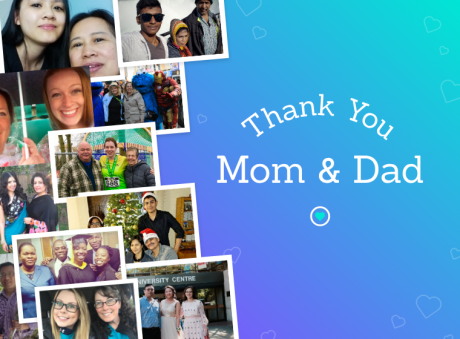Buying your own place. Is it just me, or does that sound crazy? This used to be a normal stage in the lives of many North Americans. Today, it seems like an extreme luxury for most people.
I honestly felt like I would never ever have a place to call my own a few years ago. And as far as I know, housing prices have mostly gotten worse since. Though Toronto’s bubble does seem to be bursting, general home ownership is still very difficult to reach for our generation. And I shudder to imagine what it will be like for the children of anyone who makes the choice to have some.

However, a friend of mine recently gave me some hope in this area as I went to his new apartment for a housewarming party. Unbelievable, I know! I was so shocked that I figured I should interview him to find out how he did it and what he has to say to help anyone else pull off the same miracle. Frankly, I’m glad that I did this interview because not only did it give me some useful pointers for my own fiscal future – it also helped me to see that home ownership isn’t necessarily as key as it used to be. All in all, I found a lot of value in what he said. And so I would like to share his thoughts with all of you. Let’s learn together!
Who are you?
I’m a 23-year-old Indian man. I work as an engineering consultant with a nuclear power generation company.
Did you ever think you’d be able to afford your own place?
It’s always been one of the things on my list of things to get. Given the crazy market, I was always wondering if I’d ever be able to afford my own place. But a lot of different factors aligned and I was able to quickly get to a position where I could afford a place. Ultimately, this isn’t something I would call my biggest goal in life, but it is definitely a solid stepping stone in the right direction.
I would say that I’m very lucky in getting to this point; I essentially got a whole bunch of stars to align through a combination of luck and hard work. This is my life story so far:
In Grade 7, I started working online via Elance doing data entry and video editing – this was my first source of income and was very lucrative compared to the minimum wage in Ontario at the time. It also introduced me to the global economy.

In my 2nd year of university, I used all my experience on Elance and good grades (that I worked my ass off for) to land a research gig with one of my professors. I used the relationship that I developed to land an international internship in the United States for a semester. With my Elance experience, research, international internship and good grades, I was able to land my first internship at Ontario Power Generation (OPG) in the summer after my third year of university. Then, I chained the OPG experience, research, international internship, and good grades to land another internship in Toronto for a year immediately following my term at OPG.
What happened next?
I learned that my girlfriend was going to Alberta for a year-long internship, so I decided to apply to some jobs in Alberta on a whim. I managed to land one at Husky Energy in a city about 5 hours away from my girlfriend. My manager told me that I landed this job almost solely because of my grades as well as the OPG internship. This internship was also far more lucrative (about 2x) than the one in Toronto.
About four months into the Husky Energy Internship, I got an offer from Suncor Energy for an eight month internship in the same city as my girlfriend, with far better pay than the Husky Energy internship. It was a no-brainer to cut my 12 month internship at Husky short to go up to Suncor Energy. Again, the Suncor internship was almost entirely based on my grades as well as the two past internships. I managed to land a part time internship at an e-bike manufacturer in the Greater Toronto Area that I could work on while going to my final year of school. This was entirely based on my grades.
The combination of all these experiences and my grades landed me my permanent job after graduation at a consulting company in the nuclear power generation industry. At this job, I was able to take on massive amounts of work, and get paid fairly for this work (i.e. overtime). In the past 1.5 years, I racked up over 700 hours of overtime, which culminated in me being able to build up enough capital to buy my condo. At times, this meant working up to 70 hour per week! But I enjoyed the work I did, so this was okay.
What was the biggest mistake you made while doing this whole process?
My biggest mistake was getting complacent after I signed the agreement. I had about 120 days until my closing date and I completely overlooked the fact that I could withdraw any contributions from my RRSP under the Homebuyers Plan. If I had remembered this detail, I could have maxed out my RRSP and then withdrew all the money after 90 days, effectively deferring taxes on that money until I retire while simultaneously obtaining an interest free loan from myself that I could pay back slowly over ten years. It would have been an ideal scenario, but I got complacent and forgot to look into this. And so I had to use up a larger percentage of my capital than I needed to.

I did make another mistake during the whole home buying process that I’m sure other people have made too. Before signing the agreement for this condo, I rushed into an agreement for an assignment purchase of a condo townhouse that would have been completed later in the year. I got wooed by the real estate agent who was selling that property, and she essentially convinced me it was a good deal. Luckily I came to my senses very fast and was able to back out during the lawyer review period. But I had signed the agreement anyways without thinking too much about it.
Essentially, I rushed into that agreement and if I was not able to back out of it. For example, if I didn’t have the lawyer review period that is waived sometimes by very “motivated” buyers in a hot market, then I would currently be regretting my purchase very much.
What part of buying your own place felt the best or gave you the most satisfaction?
The biggest satisfaction for me is just that I now own an asset that has more resilience against market and economic conditions. In the long run, real estate in areas such as Toronto will become more valuable as population density increases.
Other than the financial aspect, it’s pretty great living on the subway line, but not having to deal with the congestion (and tiny condo sizes) of living Downtown.
Perhaps this is related, but what’s the biggest takeaway lesson you would tell someone who wants to get a place right now?
The biggest lesson I would say is to not rush into anything. Find a place you’re completely satisfied with. If you want location – find the perfect location. If you want size – find the perfect size. And if you want a little of both, that’s possible too. Don’t rush into something without looking at alternatives, otherwise you will most likely have some regrets one way or another. Don’t just buy a property just to “get into the market”. Real estate agents will try pressure you into buying so find an agent that is willing to work with you and give you pros and cons of various places. Being patient, building your capital, and going for the place you really want is the best way to do it (not that I’m an expert or anything).
Do you have any thoughts on the real estate market right now, such as whether or not it’s a bubble, whether or not it’s a healthy environment for the next generation, what could be done to improve it, etc?
The market has ups and downs. There will always be supply and demand. Just like in the stock market, if everyone is talking about buying, it’s probably a good idea to sit on the sidelines and wait till things slow down a bit. For the last several years, everyone was saying housing prices are skyrocketing and will never stop, but they did cool for the last several months. There will always be opportunities in any type of market.
Don’t give in to the fear of missing out, or any fear in general. In my opinion, owning a house is not the be all end all goal it used to be in generations past. The world is changing and our generation and future generations will change with it. 20-30 years ago, the standard was to buy a detached house. No one considered buying a condo a good idea. Nowadays, condo living is a pretty great idea for those who like living near subway lines or downtown and not having to worry about maintenance, etc.

Having said that, the current market environment is not a good place for the current or future generations in my opinion. Housing prices (in Toronto/Vancouver) have vastly outpaced wages and it is near impossible for the majority of graduates to own property in these cities given the average salaries of new graduates. The government regulation that is taking place this year is a good start towards correcting this issue. Interest rates are going up which will make the market less flooded, however, this alone can’t solve the issue unless the supply of property goes up.
From what I see, there are many many new high rises going up that can house thousands of people. When these properties start coming on the market in the coming years, coupled with higher interest rates, and allowing for some wage growth (hopefully) between now and then, I think we will start to see a more healthy real estate market.
It is very disappointing right now to see that the young generation graduating from school essentially have to save every penny (and more) in order to enter the housing market (through no fault of their own), but hopefully with a combination of good regulation and the free market forces, this will change.
How does it feel now that you actually have YOUR OWN place?
It feels like a good achievement. It’s pretty great living on the subway line and cutting my commute to work in half. I consider myself lucky, but at the end of the day, owning a property was not an ultimate goal in my life so…on to the next thing!
On the flip side, seeing my mortgage disappear from my bank every week is not that great…
Do you have any tips or tricks for saving money?
Firstly, Canada has some great savings tools – TFSA and RRSP. Both are amazing investment vehicles and can be used to really grow your money very nicely if invested appropriately (funds, stocks, bonds, and for the more risk-tolerant person – options and futures). I highly recommend to invest in the market with these registered accounts rather than stick them in a high interest savings account (~1.5%) or something else that a bank will advertise. Why let the bank make their 10%+ a year when you could get that instead of the 1.5%
Secondly, create a budget. I can’t stress this enough. As a student on my internship, I started a very robust budget with some simple rules. I had several categories set up (groceries, entertainment, automobile, savings, rain day fund, etc.). For the first little while, after paying my basic expenses I started building up my rainy day fund (2-3 months of pay). Once that was built up, I tucked it away in a safe savings account so I could access it quickly while still getting some interest on the money. Then I started diverting any additional money to pay off all loans (student loans). Once that was done, I’d put any extra money into my savings fund that I would use for big purchases (car, motorcycle, and eventually my condo).

The key was to always have a target for minimum money saved. Optional expenses could be sacrificed as long as I met my savings goal. Thats a basic overview of my budgeting strategy. I highly recommend reading the subreddit r/personalfinance as it has great information on how to start saving responsibly. The subreddit is surprisingly full of great advice. I also highly recommend a budgeting software called “You Need A Budget” or “YNAB”. Very powerful and easy to use tool that lets you build a flexible budget. You can also replicate this in Excel, but obviously you will have to put in more up front effort to make it easy to use.
TLDR: Have a budget, stick to it. 1) Pay off loans, 2) Build rainy day fund. 3) Save every extra penny, 4) Invest with TFSA and RRSP
Do you have any general advice for anyone who wants to have their own place in the next 5 years?
I expect it will get easier to afford places as time goes on, however, the best way to guarantee this is to work your ass off. Work hard in school and get good grades. Leverage those grades to get good internships (start off researching with a professor, or something easy with a very low entry barrier). Use those internships to land a job after graduation. Work your ass off at the job and make as much money as possible, and then buy a place. If that’s the ultimate goal, then live out the rest of your life enjoyably. If you have further goals, then work your ass off till you get to them.

However, I want to stress that no-one should be stressing about buying a house right out of university. What’s more important is to do what you want and find what you want to do in life. Right out of graduation most people really don’t know what they want to do with their life. And that’s nothing to stress about.
For the few years right out of school, you can essentially do whatever you want. You can chase your dreams and hopes. If you want to travel, then travel. If you want to experiment with writing a book, or starting a blog, or starting a business, this is the best time for you to do it. Do it before you have the obligations of home ownership, marriage, parenthood, etc. Personally, I started working at my company. I immediately knew this is what I wanted to do – technical work that was challenging, fun, and rewarding.
Eventually I bought a condo because it felt like the right thing to do. I wasn’t stressed about buying a place, nor did I feel pressured. I had saved up comfortably. And I did things like travel to various places, and experiment with e-commerce. All the cool things that I always wanted to do like buy and ride motorcycles, I had done. I took advantage of the fact that I had no obligations. This is probably the most important thing to do since you’ll never get to enjoy life as much as you will in the first few years after leaving the school system.
Buy a place when it feels stress-free and the right thing to do. There is nothing wrong with renting and taking your savings from renting and throwing it into investments and making money that way (there are tons of comparisons online about this). Home ownership is just one path of many. And if what you want is to buy a property in 5 years, then set up a plan and stick to it. But don’t forget to indulge in the other things that you enjoy along the way.
Finally, do you have any general advice for anyone in high school entering university and/or someone finishing university?
Entering University:
1) Whatever field you’re in, look for internships/summer jobs in your field. Experience is absolutely essential and you will not get ahead without it, so start looking early, and apply to everything!! If you land one internship, don’t be tempted to take the easy path and go back to the same company summer after summer. University is the one time you can take advantage of multiple companies without being considered a job hopper. Test the field, try out different employers/industries, and you’ll get a feel for the real world and be well prepared.
2) Your grades are very important until you get experience and don’t let people tell you otherwise. Out of my four internships, three of my managers have directly told me they hired me because my grades stood out among applicants. Obviously as you get more experience the grades matter less and less, and after your first after-graduation job, they’re essentially meaningless. Until then however, work your ass off and get good grades.
3) Regardless of whatever field you’re in, think about ways to make it profitable. If it’s becoming a consultant in that field, find out what you need to get to that level. It’s great to go to school for what you love to do, but at the end of the day, the world operates on money and if owning material things like houses is a goal of yours, then look for ways to monetize what you love to do. Whether it’s taking additional entrepreneurial courses so you can start your own business, or taking finance or marketing courses to run your business or promote it, all of these will help.
4) Take advantage of international experience opportunities. I regret not taking advantage of more opportunities, but luckily I was able to go to the USA and to China during my schooling (and I didn’t graduate any later or delay any courses). There are hundreds of opportunities so take advantage of them while you can..It will not be so easy to go abroad with scholarships and student visas once you graduate. International experience – whether it’s internships, semester abroad, or even short conferences, really stand out when you join the workforce and this is universally true in all professions.
5) If it’s not a terrible burden, it is completely unnecessary to go to a university where you have to move away from home. Understandably, you will want to move away from your parents (or whatever your living situation is). But nine times out of ten it is not necessary and will be to your detriment. The additional living costs will pile up your student debt and make it incredibly harder to purchase a house after graduation. The loan will increase your debt ratio, which will make it harder to get a mortgage approved for the amount required to buy a house in Toronto. And while you pay off those loans, you won’t be able to save the full amount you could be saving, while house prices continue to increase.
Basically, unless absolutely necessary (i.e. the school in your city does not have the program you want, or you are going to a school like Waterloo for their fantastic co-op program—see my first point about internships), there is no benefit to moving away from home for university. Personally, I stayed at home all through university and was able to graduate having payed a total of 10K for four years of engineering education (after scholarships and bursaries), managed to spend a semester abroad and some time in China, all of which was paid for almost entirely through a scholarship (so I still got the residence experience but at no cost), and graduated with no student debt. This would not have been possible had I decided to leave to another city or live on residence for university.
Entering the real world:
1) Don’t stop developing your skills. The world moves on with or without you, so it’s better to stay up to speed. Develop skills in areas peripherally related to your focus, and don’t be afraid to learn random things. You never know when they’ll come in handy. Many times in interviews, I have been asked about some random skills I listed on my resume. These kind of things that stood out are what made me get many of my offers. You don’t need to take courses in school (you already got the degree, no need to give more money to the education overlords). The internet can teach you everything you want to know and more so check out places like Udacity, Coursera, etc. These are great places to learn relevant skills.
2) Don’t be afraid to learn programming and don’t dismiss it as something you don’t need to know. I guarantee you that knowing some programming will make you stand out in any field that is not directly related to programming. Being able to provide efficiencies, automation, and unique solutions is something every employer looks for, and you can easily make a name for yourself with some basic skills.
3) Don’t get attached to any one job or employer. Look out for yourself and go where you think you will get the most benefit. At the end of the day, an employer is looking out for themselves, and you will be looking out for you. Take advantage of trying out different employers early in your career, or if you end up in a large company, take every opportunity to try different positions within the company.
4) Work hard, but work fairly. Don’t do under the table work, or work excessively extra hours for no benefit to yourself. I understand that in some industries, working long hours is the norm, but make sure there is some benefit in it for you – whether it’s performance bonus, promotional track, or overtime pay, etc. As mentioned before, at the end of the day, you need to look out for yourself. This is a good time in the labour market and there is a lot of opportunity in the current economic environment.
5) Although you should be saving furiously if you want to buy a house, remember to treat yourself. Take vacations to cool places and see the world. Buying a property is great, but seeing the world is something you should do when you’re young, not old and retired after having spent your childhood paying off a mortgage.
—
So, there you have it! A man chock full of wisdom and experience shares his personal path to a certain degree of personal success. He did mention to me that he didn’t want to boast, brag, or make it seem like he had found some true or best path. He was simply trying to share his story as clearly and honestly as possible. I would say that he succeeded. What I don’t see here is boasting. Instead, I see genuine success built off of, as he says, working one’s ass off to achieve one’s goals.

Were you inspired by this read? I know that I was. It made me consider all the time that I spend on non-essentials and entertainment. I saw areas where I could certainly be spending time on working towards my goals. I hope that you also were inspired to try a little more. To push a little harder, and work a little smarter towards the goals that truly matter to you. It is unfortunate that a few years ago, someone could have what he has without working nearly as hard. And I would agree with anyone who has read this and feels frustrated regarding the degree of effort required to achieve this goal in 2018. The market in most major cities is crazy right now, especially in Toronto.
Home ownership is further away for most of us than it has been for generations. Capitalism is running rampant, causing trouble everywhere it goes. I understand. I too am frustrated. Still, this is a story that should remind us that anything is possible if you’re willing to put in the work. I know, it sounds like a third grade cliché but it really is true. The thing we don’t hear frequently enough in grade school is the importance of the effort component. Human beings are capable of literally any feat, given enough time and effort invested. This makes some things impossible for the average human lifespan but aside from these true fantasies, your goals are achievable.
You can have what you seek. You just need to sit down, do your research, get the required information, make a plan… and then work your ass off and learn from your failures until you succeed. You can do it! Stay strong, my friends.

Your Chance To Win $20,000 By Saying Thank You
*Opinions expressed are those of the author, and not necessarily those of Student Life Network or their partners.




